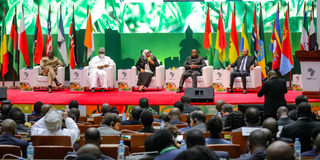Prime
Modern tech to spur youth empowerment, says Samia

President Samia Suluhu Hassan (centre) speaks during the Africa Food System Forum (AGRF) 2023 Summit at the Julius Nyerere International Conference Centre (JNICC) on September 7, 2023. Sitting from left are Kenya’s President William Ruto, Senegal’s President Macky Sall, Burundi’s President Évariste Ndayishimiye and Zanzibar President, Dr Hussein Ali Mwinyi PHOTO | Ericky Boniphace
What you need to know:
- President Hassan told an audience that 1,252 youth have been roped in the Building Better Tomorrow (BBT) programme so far and that her government has set aside Sh7 billion to support the initiative
Dar es Salaam. President Samia Suluhu Hassan emphasised yesterday that modern technologies will spearhead youth development.
She said the government will leave no stone unturned to access the relevant technologies to the youth and other industry players for productive agriculture.
The Head of State made the remarks when she was addressing a session dedicated to youth empowerment at the on-going African Food Systems Forum AGRF 2023.
She said Information and Communication Technologies (ICT) was better placed to drive the desired agricultural transformation agenda for the country.
"In agriculture, we cannot avoid modern technologies," she stressed when she addressed a gathering at the Julius Nyerere International Convention Centre (JNICC).
ICT would not only be applied in developing database in agriculture but also in enhancing various facets of research but also crop preservation.
President Hassan said the government was determined to invest heavily in agricultural research in order to improve yield output.
"Agricultural research has to begin with studying the soil health, have database of farmers and extension service," she said.
One of the government's priority areas in the endeavour is to invest in the production of quality, hybrid seeds with high yield capacity.
According to her, the government's long term plan is to ensure at least three quarters of the improved seeds are produced locally.
Currently, she explained, the government is upgrading various facilities at its airports and ports for preservation of fresh produce awaiting export to the markets abroad.
She added that her administration was determined to ensure success of Building Better Tomorrow (BBT), a programme focusing on agribusiness for the youth.
It is one of several initiatives being taken to attract youths, who account for 60 percent of Tanzania's population, into productive agriculture.
Under BBT, youths are mobilized from across the country, accessed to land, technology, markets and skills to produce food and other crops.
Already, there are 812 youths being trained for skills on modern agribusiness in block farms.
At least 13 incubation centres scattered in various parts of the country.
Under BBT, youths would be supported through what is described as 'a farm class model' under which those enrolled are given 10 acres each.
They will be supported through loans and grants to engage in productive agriculture, a measure which is geared to raise the country's stakes in agribusiness.
President Hassan told an audience comprising mainly the youth at the JNICC that so far 1,252 youth have been roped in the programme and that the government has set aside Sh7 billion to support BBT.
Agricultural sector stakeholders believe that the programme was among measures being taken to ensure the country attained attain food sufficiency come 2030.
In the remaining eight years from now, the government would ensure the agriculture budget is raised to 10 percent of the country's annual budgets.
Agriculture in Tanzania currently accounts for 26 percent of the GDP, 65 percent of industrial inputs and 30 percent of foreign exchange earnings.
The interventions underway, including increased budget allocation to agriculture to nearly a trillion shilling would create 1.5 million direct jobs by 2030.



